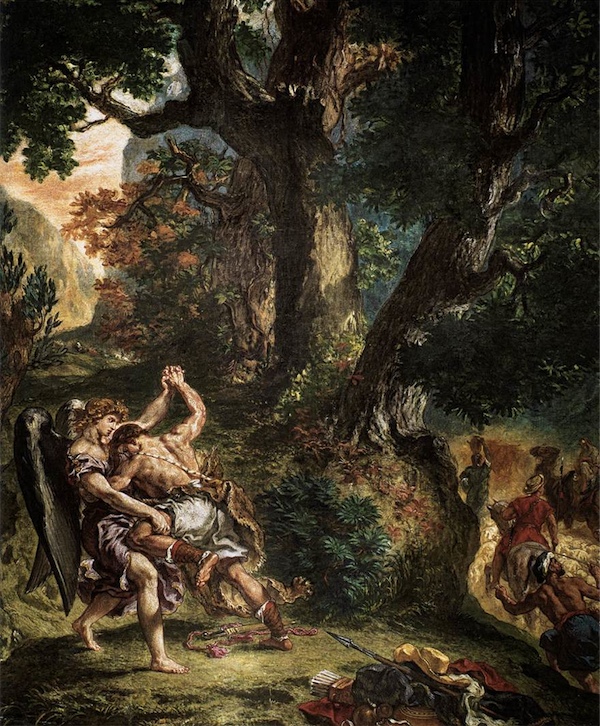
If we were like angels, blameless and freely able to exercise
perfect self-control, we would not need rules or regulations. Why,
then, do we have so many laws and statutes? Because of man’s
wickedness, for he is constantly overflowing with evil; this is why a
remedy is required.
—John Calvin, Sermon on Galatians 3:19-20, “The Many Functions of God’s Law” (1558) in the volume Sermons on Galatians (Edinburgh 1997).
If men were angels, no government would be necessary. If angels were to govern men, neither external nor internal controls on government would be necessary. In framing a government which is to be administered by men over men, the great difficulty lies in this: you must first enable the government to control the governed; and in the next place oblige it to control itself. A dependence on the people is, no doubt, the primary control on the government; but experience has taught mankind the necessity of auxiliary precautions.
—James Madison, The Federalist No. 51 (1788).
It’s an article of faith among the religious right that the U.S. Constitution is a vessel of their religious values. On the other hand, the view of mainstream constitutional historians has been pretty consistent to the effect that many of the Founding Fathers were deists and the Constitution itself rested on a firm belief in the separation of church and state designed to create a matrix in which all religions would be equally welcome and the state firmly disentangled from all of them.
Easy as it is to pick apart many of the claims of figures on the religious right about the role of Christianity in the Constitution, it’s undeniable that theological considerations played a vital role in the crafting of the Constitution and in the process of building popular support. This passage from The Federalist Papers might just be the most often quoted because it so forcefully summarizes the key animating principle that drives the doctrines of separation of powers and checks and balances—the essential innovations of the American Constitution. But, as a friend on the faculty of the Army JAG School in Charlottesville recently flagged for me, these lines were not original to James Madison. They were lifted almost without change from a sermon written by John Calvin.
Can we be certain that Madison did not arrive upon this image on his own? Yes. Recall that Madison, though a Virginian, traveled north to Princeton, New Jersey to get his education—at an institution that rested firmly in the bosom of Presbyterianism and made the teaching of Calvinist doctrine an essential part of its curriculum. Guiding the process at this time was Dr. John Witherspoon, a stern son of the Scottish Kirk and simultaneously a Founding Father who served for New Jersey in the Continental Congress. Witherspoon had a favorite student with whom he collaborated closely throughout this period: James Madison.
Calvinist doctrine about the nature of man, about man’s inherent fallibility, had a strong influence on political philosophy as it was taught and discussed in Princeton. And there was a second very practical consideration: unlike its name-brand Protestant competitors Lutheranism and Anglicanism, Calvinism was not, by and large, a state religion. This led Calvinist philosophers, particularly those operating in the English-speaking world, to advance the notion of separation of church and state and ideas of religious liberty–as a matter of pragmatic self-interest. A number of historians, pointing to the overlap between pockets of Calvinism and democracy, convincingly argue that Calvinist thought propelled Enlightenment values including respect for the dignity of humankind and democracy. That argument may be made clearest in the United States, in fact.
But saying that Calvinist theory helped support the architecture of the Constitution is different from saying that it rests on Calvinism or indeed any theology. And indeed, that point may be made most effectively by looking at James Madison himself. Was he the “stern Calvinist” that Witherspoon sought to make of him? Biographers who want to make Madison into a model Presbyterian can scour his life and find some evidence of it, particularly from his younger days. He actually wrote and told friends in 1773 that he had a “transient inclination” to enter the ministry. He was a pewholder in a Presbyterian church. On the other hand, he married in the Anglican church and often attended Episcopal services as well. But as Madison turned to the world of politics and emerged as an important public figure, he seems to have drifted steadily away from organized religion. His religious views were so carefully guarded that his political adversaries attacked him, just as they attacked Jefferson, as an atheist. An Episcopal bishop recorded his sense, following a dinner time conversation with Madison, that he held a skeptical view of organized religion and was probably a deist, like Jefferson. In 1815, a visiting merchant from Boston has Madison expressing enthusiasm for the Unitarian ideas then sweeping New England. On other occasions he bragged about not having attended religious services for “many years.” But overall, Madison is so tight-lipped about his religious convictions that it is impossible to draw any ultimate conclusions about his faith or lack of faith. As to Constitutional politics, by contrast, that task is an easy one.
James Madison may be the most important of the Founding Fathers on questions of Constitutional theory. But he also plays a vital role in helping us understand how theology indeed influenced the United States Constitution—and also in allowing us to chart the limits of that influence.
Listen to the fourth movement of Felix Mendelssohn’s Symphony No. 5 in D Major, written to mark the 300th anniversary of the Augsburg Confession, and the birth of Protestantism, and based on Martin Luther’s hymn, “Ein’ feste Burg ist unser Gott,” here in a performance by the Berlin Philharmonic under Herbert von Karajan.


